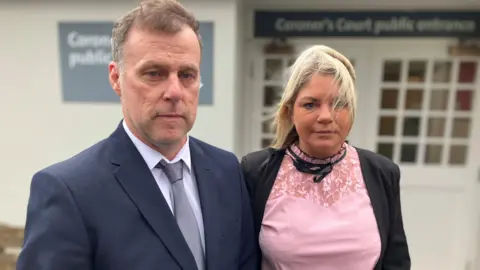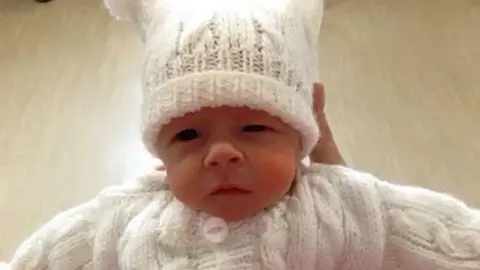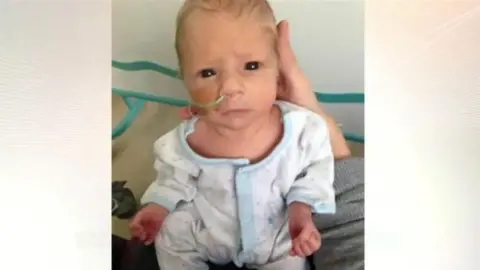Baby inquest findings 'everything we fought for'
 BBC
BBCParents who have spent a decade campaigning for answers about their baby's death said the findings at his second inquest were "everything we fought for".
Eight-week-old Ben Condon died in 2015 at Bristol Children's Hospital - six days after being admitted with breathing difficulties.
Unsatisfied with an inquest held in 2016, Allyn and Jenny Condon fought for a second inquest believing antibiotics could have prevented his death.
Earlier the coroner reached a number of damning conclusions about the care Ben received and found a bacterial infection had been a cause of his death, but it could not have been prevented.
Speaking after the conclusion, Ben's parents thanked the coroner for the "thorough review", calling it "a basic human right we should have been afforded a decade ago".
They added: "We are grateful that the trust stands by their position that their failure to prescribe earlier antibiotics contributed to Ben's death and that on the balance of probabilities, had they treated him with antibiotics earlier, he would have survived."
The hospital trust said it was "deeply sorry" Ben died in its care and for the way it communicated with his family following his death.
 PA Media
PA MediaRobert Sowersby, assistant coroner for Avon, recorded a new cause of death as acute respiratory distress syndrome (ARDS), pseudomonas bacterial infection, metapneumovirus (hMPV) and prematurity.
The coroner also found the administration of surfactant – given to assist Ben's lungs – contributed to the baby developing an air leak into his pericardium and then suffering a cardiac arrest.
Mr Sowersby criticised the "patronising" approach of Bristol Children's Hospital towards Ben's parents and said it was "manifestly wrong" they were not informed or consulted about procedures that carried risks to their baby.
Ben's parents said the findings were "all we ever wanted and everything we have fought for".
'We will continue to fight'
They explained they had hoped the hearing "would bring an end to all our unanswered questions" and enable them to begin rebuilding their lives.
However, during the inquest a document appeared to suggest that four swabs were taken from Ben's body and sent for tests in the 48 hours following his death.
This was despite his parents being assured that there was no need for their baby to undergo a post-mortem examination, leading to his body being cremated.
They added: "We will be contacting the General Medical Council and the Human Tissue Authority to trigger the process for a potential criminal investigation under the Human Tissue Act 2004.
"We will continue to fight until we are sure no other family will have to face the irreparable pain and suffering we have had, and are still having, to endure."
 AFB
AFBDuring the inquest, Ben's parents described how his temperature kept falling below targeted levels and he was frequently hypothermic.
The coroner said: "The fact that a seriously unwell baby was allowed to drop well below a targeted temperature seems to me to be significant."
He added that he could not conclude that this, or the management of Ben's ventilation, contributed to his death, but was "still a concern".
Mr Sowersby added the overall picture of Ben's care suggested "the consultants looking after Ben didn't realise quite how unwell he was until it was too late".
'Unacceptable delay'
The coroner said the decision to give Ben a third dose of surfactant on 17 April carried "significant potential risks", but this was not discussed with his parents, which he described as "manifestly wrong".
He added: "This was part of what seems to me to be a patronising approach to Ben's parents in which they were not told what was going on, or why, and nor were they included in decisions around Ben's treatment."
Mr Sowersby added that there was an "unacceptable delay" in giving Ben antibiotics prescribed on the day of his death.
He also criticised the communication with Ben's parents, who were told at 18:30 BST that day that their baby may not survive.
"It is very hard for me to understand how it could have taken this long for them to have been told this stark fact," he said.
"I hope Ben's family can take some element of pride in what they have achieved in their battle for the truth," said Mr Sowersby after reading his conclusion.
"Perhaps most important of all, the changes the trust has made in recognition of the areas where they didn't care for Ben as well as they should have."
In a statement, Prof Stuart Walker, hospital managing director at University Hospitals Bristol & Weston NHS Foundation Trust, apologised and said: "We have undertaken significant learning and reflection in the 10 years since then.
"We accept the conclusion of the assistant coroner, and I would again like to acknowledge the distress experienced by Ben's family."
Follow BBC Bristol on Facebook, X and Instagram. Send your story ideas to us on email or via WhatsApp on 0800 313 4630.
